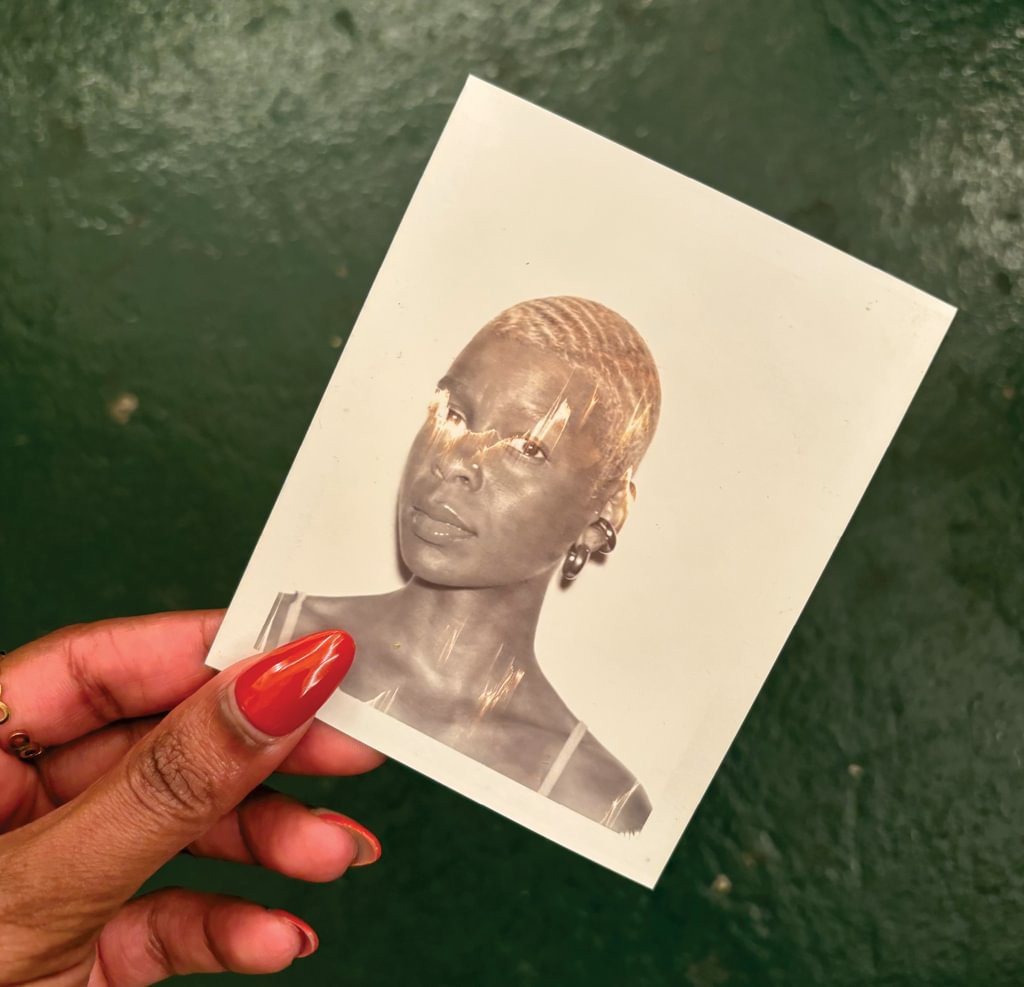Makin’ a Dolla Out a Dime
Talibah Safiya delivers a slower, sparser, and more luxurious version of her “Delicious”
By Charles L. Hughes

Talibah Safiya photograph by Anthony Lorenzo
It’s a fitting origin story. As acclaimed Memphis artist Talibah Safiya began work on a new blues-infused project that became her astonishing 2024 album Black Magic, her husband brought her a book that he bought: Angela Davis’s Blues Legacies and Black Feminism. For Safiya, the reading was revelation. Davis’s foundational book centers Black women in a vibrant and resistant blues tradition, and Safiya was struck as she read Davis exploring how blueswomen exemplify a liberated expression that Safiya identifies as “our gall to be full selves.” For Safiya, who revisits one of Black Magic’s key tracks for this issue, this realization helped her claim her place in the blues legacies so deeply associated with her home, but in which she could not always find herself.
“I’m a millennial Black woman from South Memphis,” she notes, “so the blues belongs to me.” But she admits that, growing up, she “was too young and uninterested in the version of the blues popular in my hometown.” That conception of the blues, reduced both sonically and symbolically, too often gets cast in amber by civic narratives and tourist campaigns, appealing to the desires of (mostly white) audiences who seem primarily interested in a faithful re-creation of a previous era’s music and the soothing cultural mythology that often accompanies it. When paired with ongoing inequities in the music business and beyond, young Black artists like Safiya can find themselves either limited by or excluded from the music that their community—often their literal elders and ancestors—created and nurtured. As she recorded Black Magic, Safiya found inspiration in the liberating, “full self” complexity of the blueswomen as she asserted her own place in the mix.
Blues Legacies and Black Feminism was a perfect complement to the project’s other taproot: the catalog of High Water Records, an archival label housed at the University of Memphis, where Safiya worked as an artist-in-residence. Safiya and her young collaborators sampled and drew inspiration from these recordings—featuring artists like R. L. Burnside, Junior Kimbrough, and Jessie Mae Hemphill—as they developed their distinct contribution to a living, woman-centered blues tradition. “We all have a right to distill our influences through our own experiences,” Safiya reminds, “without having to force it to sound like it did before or how people dominating the field of the blues think it’s supposed to sound.”
Indeed, Black Magic isn’t roots music; it’s root work—using the musical past to conjure and heal. The album reflects Safiya’s ambitious craft and honors the “deep self-acceptance” that she hears in blues foremothers like Ma Rainey and Sippie Wallace and more recent influences like Aretha Franklin and Valerie June. It symbolizes the artistry that led her fellow brilliant Memphian Jamey Hatley to describe Safiya as “a whirlwind, a storm, a creatrix of worlds and herself” in the Oxford American in 2020. And it represents the next step on an artistic path that’s led Safiya simultaneously outward and back home, finding the unexpected in the familiar and honoring legacies without being beholden to them. “I love music that talks about a place you can see, a feeling you can feel, a party you want to go to,” she says. And Black Magic journeys across space and time as Safiya and her crew put sounds and spirits in conversation. As Safiya describes it, “This project digs deep backwards to pull us into the present moment’s opportunity.”
The title track announces this intention. “We come from a Black-ass city,” Safiya asserts over the insistent sampled beat of R. L. Burnside’s brooding stomp “Bad Luck City.” She then immediately places Memphis’s radiant Blackness in a diasporic context: “We said our pledge of allegiance to the capital of Egypt.” Referencing the Tennessee city’s naming for its ancient Egyptian counterpart, Safiya blends the time-and-space-collapsing remixes of Afrocentric forebears like Sun Ra with the blunt, self-referential poetry that’s defined Memphis music from blues to hip-hop and beyond. “I really feel like Memphis is one of my main collaborators, at this point, as much as I’m referencing my relationship to this land [and] how rich this city is because of Black culture,” she says. Combining “bad luck” and “Black magic,” Safiya’s Memphis is a place of expansive, continuing possibility.

Talibah Safiya holding a portrait of herself by Silas Vassar III. Photo courtesy Talibah Safiya
Safiya makes this point most directly through the music. Black Magic does not sound like the High Water source recordings, nor does it reiterate a calcified or nostalgic notion of the musical past. Instead, the musicians create a tapestry of sound designed “to appeal to all different tastes and parts of our history.” At the center is Safiya, whose remarkable singing moves between tones and textures with precision and flexibility. This, too, is a local tradition, in which brilliant Black women from Memphis Minnie to Gangsta Boo use blues honesty, musical innovations, and transformative voices to redirect the city’s musical identity as it enters a new era. For Safiya, like her predecessors, the blues is a vibrant and living practice rather than a rote set of musical and lyrical characteristics. This practice—to “finger [the] jagged grain” that Ralph Ellison identifies as a “blues impulse”—anchors the album, from the throbbing funk of “Papa Please!” to “Jack and Jill”’s Western fantasia through the relentless gospel-blues “Have Mercy.”
After traveling through the defiant pleasures and “jagged grains” of the blues tradition, accompanied by her talented Memphis collaborators, Safiya ends Black Magic with a soul-drenched affirmation of Black joy. “Delicious,” with its layered vocals and soft waves of instrumentation from A.N.T.E, is a reminder of the ways that blueswomen in Memphis and beyond have long centered pleasure as both sustenance and rejuvenation. Safiya’s performance further offers echoes of r&b auteurs like Sade and Erykah Badu, bringing the album to a close in a refuge of self-love. “It grounds you from what has been a kind of chaotic journey,” Safiya suggests, “and I think that’s the deep exhale that you have been able to feel through all these different versions of yourself. It’s also giving in to where I am in my life and where I am in expressing myself.”
In the alternate version included on the vinyl and playlist that accompany this issue, “Delicious” is slower, sparser, and even more luxurious, centering Safiya’s tender clarity against subtle percussion and flute as she and the listener rest together in the moment. This new take was inspired by Safiya’s appearance at the 2024 event that announced the Oxford American’s Memphis-music issue and honored the legacy of Stax Records, another of Safiya’s creative wellsprings. This new, live-in-the-studio “Delicious” emphasizes how—like aforementioned predecessors from Rainey to Badu—Safiya builds a connection with her audiences that makes the stage into its own space of sonic conjuring. At the center is her singing, as she travels around the smooth caress of the melody from low intimacy to trembling high notes. Outside of the crisp production of Black Magic, “Delicious”—like Safiya’s other songs—expands even further in the airy atmosphere of live performance, even as it retains the “deep exhale” that Safiya seeks to share with her listeners in whatever moment and context they meet her.
In either configuration, “Delicious” is a fitting statement of Safiya’s commitment to blues liberation as restorative practice, sounding the “deep self-acceptance” that Safiya hears in blueswomen across the generations. As Jamey Hatley writes, “What Safiya’s music and the music of all of these Memphis women uncover are the parts of me that I want to write out of the story—my sad parts, my fickle parts, my angry parts, my bitter parts, my heart that doesn’t know why it keeps trying to love ghosts, the part of me that isn’t quite sure that I am a worthy place to start.” Safiya uncovered that in the blueswomen, and such acceptance and celebration are also heard across the legacy of Black women who have transformed the South and the world, with Anna Julia Cooper, Zora Neale Hurston, and Fannie Lou Hamer all joining the call-and-response. “This project has been finding me for so long,” Safiya attests. “The story of regular-ass amazing Southern Black women.” For the young artist, then, these stories—illustrated so powerfully by “Delicious”—serve as both destiny and beacon, as the literal and figurative air she breathes. Breathe with her.




